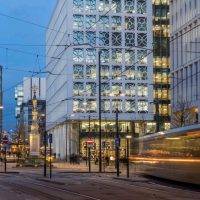To provide the best experiences, we use technologies like cookies to store and/or access device information. Consenting to these technologies will allow us to process data such as browsing behaviour or unique IDs on this site. Not consenting or withdrawing consent, may adversely affect certain features and functions.
The technical storage or access is strictly necessary for the legitimate purpose of enabling the use of a specific service explicitly requested by the subscriber or user, or for the sole purpose of carrying out the transmission of a communication over an electronic communications network.
The technical storage or access is necessary for the legitimate purpose of storing preferences that are not requested by the subscriber or user.
The technical storage or access that is used exclusively for statistical purposes.
The technical storage or access that is used exclusively for anonymous statistical purposes. Without a subpoena, voluntary compliance on the part of your Internet Service Provider, or additional records from a third party, information stored or retrieved for this purpose alone cannot usually be used to identify you.
The technical storage or access is required to create user profiles to send advertising, or to track the user on a website or across several websites for similar marketing purposes.
 A new study from researchers at University College London claims that the journey to work has benefits for people’s mental health, fitness levels and work-life balance. According to the study into attitudes to commuting led by neuroscientist Joseph Devlin, around half of the 3,000 people surveyed said taking in the scenery by train was the ‘best part’ of heading into the while a quarter said it was the chance for ‘me time’, including reading, listening to podcast or catching up on emails. More →
A new study from researchers at University College London claims that the journey to work has benefits for people’s mental health, fitness levels and work-life balance. According to the study into attitudes to commuting led by neuroscientist Joseph Devlin, around half of the 3,000 people surveyed said taking in the scenery by train was the ‘best part’ of heading into the while a quarter said it was the chance for ‘me time’, including reading, listening to podcast or catching up on emails. More →





 Scotland is to become the latest nation to trial a
Scotland is to become the latest nation to trial a 
 More than two-thirds (70 percent) of UK businesses have been the victim of a successful network security attack in the last year, and 65 percent have been the victim of at least one ransomware attack in the last 12 months, according to new research from
More than two-thirds (70 percent) of UK businesses have been the victim of a successful network security attack in the last year, and 65 percent have been the victim of at least one ransomware attack in the last 12 months, according to new research from 
 New ways of working will boost UK productivity and increase employment levels in cities outside of London, according to a new report from KPMG. And as businesses in some sectors prepare for employees to spend two to three days a week working from home on a permanent basis, demand for office space could see capacity potentially increase by as much as 40 percent, according to a new KPMG report,
New ways of working will boost UK productivity and increase employment levels in cities outside of London, according to a new report from KPMG. And as businesses in some sectors prepare for employees to spend two to three days a week working from home on a permanent basis, demand for office space could see capacity potentially increase by as much as 40 percent, according to a new KPMG report, 
 I recently stumbled upon the phrase epistemic trespass, which describes the phenomenon of people making judgements in fields in which they have no expertise. I came across it as it was used to explain the sudden explosion of opinions about Afghanistan from a hitherto unknown horde of experts. Which may or may not be the same horde that has been so very certain about immunology and public health during the pandemic. It’s an old idea and one that needs to be treated with care, for reasons set out by Noah Smith
I recently stumbled upon the phrase epistemic trespass, which describes the phenomenon of people making judgements in fields in which they have no expertise. I came across it as it was used to explain the sudden explosion of opinions about Afghanistan from a hitherto unknown horde of experts. Which may or may not be the same horde that has been so very certain about immunology and public health during the pandemic. It’s an old idea and one that needs to be treated with care, for reasons set out by Noah Smith 
 In its latest whitepaper,
In its latest whitepaper, 
 A new
A new 




 A third of UK workers admit they’ve forgotten the password to their computer, office entrance or locker, one in five workers have forgotten a colleague’s name or called them by the wrong name and say their small talk skills have been impacted by working from home. Those are some of the findings of a new report from
A third of UK workers admit they’ve forgotten the password to their computer, office entrance or locker, one in five workers have forgotten a colleague’s name or called them by the wrong name and say their small talk skills have been impacted by working from home. Those are some of the findings of a new report from 
 As the UK government has withdrawn its advice for employees to work from home, more organisations than ever will be instituting what have become known as hybrid working models: 68 percent globally, according to research from
As the UK government has withdrawn its advice for employees to work from home, more organisations than ever will be instituting what have become known as hybrid working models: 68 percent globally, according to research from 









September 23, 2021
Resilient companies need the trust of their employees more than ever
by Kate Field • Comment, Workplace